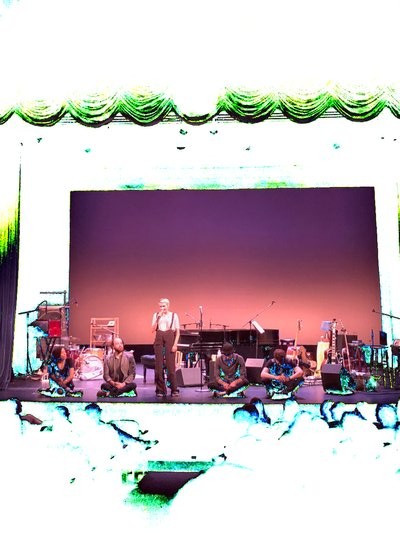
Heather Christian is a self-described artist, musician and actress. She is also a ghost whisperer. Yes, you read that right. Ms. Christian routinely converses with the dead.
On Thursday night, July 26, at Guild Hall in East Hampton, Ms. Christian took to the stage to perform her show “Animal Wisdom.” For 11 months, she has brought the performance to different venues, though none similar to Guild Hall. Before the performance began, Ms. Christian informed the audience that the show “is not intended for a theater” and as such, her team would be experimenting with the physical space while performing.
If Ms. Christian and the “Animal Wisdom” cast—Eric Farber, drums; Maya Sharpe, violin; Fred Epstein, double bass; Sasha Brown, guitar—adjusted their routine to better fit the venue, it was not evident in their performance.
The show is filled with song, action and connecting with spirits of those that have long passed. Weirdness, as a noun itself, fails to justify what Ms. Christian has created. Brilliantly charming, yet masterfully frightening, her performance gives off a sensation of curious confusion.
The show begins with Ms. Christian warning audience members of a long, continuous stretch of song that comes at the end of the performance. Played in low lighting—nearly blackout—she tells guests that “if your eyes get bored, close them. The show is happening in your mind.”
And though skepticism may be prevalent at the show’s start, it quickly fades with the power of Ms. Christian’s talent—it seems clear she is right: even in full lighting, the show is happening as much in your mind as it is on stage.
Ms. Christian’s voice is feverishly good. Her songs burst off the stage and percolate in tingles through your spine. She starts with an introduction of the first ghost she met—Yohanna—and continues to explore her own family history through the lens of spirits. At different points during the show the audience meets her grandparents, now ghosts who are “lovers in the garden,” and Miles, Ms. Christian’s godfather, who straddles a literal line between mortality and becoming a ghost.
Ms. Christian’s knack for emotion adds extra depth to the show. Though she is acting, her expressions throughout the performance are raw—it is as if she is experiencing the sensation of meeting the ghosts along with the audience. At one point, she even breaks down, crouching on the stage in a display of frustrated intensity.
The show is also interactive—at one point, Ms. Christian invites audience members to participate in a “Coca-Cola communion service.” She later opens up the performance to audience prayer—one that the actors take part in with the guests. She often addresses the audience directly, and somehow invokes a sense of urgency that to pay attention to one’s own “ghosts” is instrumental.
Cleverly described as a “requiem mass,” by Ms. Christian, one gets the sense that the show is not actually about religion at all. She explains during the performance that a requiem mass is a practice by which “a newly dead soul can be put to rest.” She also says that the prolonged chorus at the end of the show serves this purpose. And it does, though it seems to serve more than just that.
When the show quite literally pauses—for the requiem mass—and audience members are forced to act in their minds, the darkness gives way to self-inquiry. Ms. Christian seems to pose the question, “How do we think about death?” and prompts curiosity about possible afterlives.
The literary critic Lionel Trilling once described the job of a storyteller as “to reveal the human fact in its veil of circumstance.” With “Animal Wisdom,” Ms. Christian has created a show, and a story, that accomplishes just that.